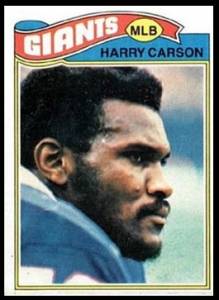
This is the day that Harry Carson, 59, knew was coming. He’s a former NFL linebacker who, for 13 seasons, pummeled opposing quarterbacks as part of a storied defensive line for the New York Giants, earning a 1986 Super Bowl title along the way. But that was yesterday.
It’s a time in his life that, for better or worse, Carson can only relive through the rearview mirror. And he’s just fine with that. In fact, this year marks 25 years since Carson retired from the game.
As the average length of an NFL career now spans roughly six years, according to a recent league report, few players can ever hope to achieve the sort of longevity that Big Blue’s No. 53 enjoyed. But then, even Carson himself – who was inducted into the Hall of Fame in 2006 – wasn’t sure how long he’d last. (“I knew full well that even though I was pretty good, it was only a temporary situation,” he reflects).
Well before the NFL, a $9 billion-a-year industry, reached its controversial $765 million settlement with former players suffering the debilitating impact of head injuries, Carson – who, by his own count, experienced more than a dozen concussions – has been a prominent advocate pushing the league to tackle the issue.
 And yet Carson has been equally outspoken on other matters, including efforts to create more diversity among the NFL’s front office personnel as well as encouraging athletes to brace themselves, both financially and emotionally, for that inevitable day when they’re no longer active players. In 2011, Carson documented his own highs-and-lows in the sport with a memoir, Captain For Life.
And yet Carson has been equally outspoken on other matters, including efforts to create more diversity among the NFL’s front office personnel as well as encouraging athletes to brace themselves, both financially and emotionally, for that inevitable day when they’re no longer active players. In 2011, Carson documented his own highs-and-lows in the sport with a memoir, Captain For Life.
As part of a 2007 story that I wrote for The Crisis magazine about an initiative designed to support professional athletes, I spoke to Carson about his career, forging new opportunities, and life after any given Sunday. Published here for the first time, these excerpts are from that interview with Carson, a perennial fan favourite who remains in the public spotlight as a broadcaster and motivational speaker.
You were a 23-year-old man when you debuted with the New York Giants in the 1970s. Surely there were plenty of distractions. How did you keep your priorities in order?
I had to be ready. Just focusing on getting a championship without preparing for what happens down the road doesn’t make a lot of sense.
And yet we’ve seen so many people struggle to do so. How did you come to that realization?
There are no jobs out there for sacking quarterbacks in the real world. When I started out in the NFL, I was actually working during the off-season to make some money. I had jobs in college recruitment and personnel, so that gave me a sense of what people were earning out in the real world. Look, I think it’s up to individuals themselves to prepare for what happens next, even if they aren’t making the best choices along the way. But staying grounded definitely gave me a sense of perspective and purpose.
You mentioned that you were fully aware that your NFL career would be temporary. At what point did you begin planning for the next stage?
Try Day One [laughs]. I’ll never forget when my attorney came to me and said that I should consider incorporating myself. Once I stopped playing, it was all waiting for me. We all have something that we can use. For me, it was public speaking – which I managed to carve out into a little niche. I set up a sports consulting and promotions company when I was still playing with the Giants. At the time, I was making a lot of personal appearances and speaking before groups about my experiences and about leadership. What you have to do is separate the money that you receive as a player from the money that you make doing other things.

Harry Carson details 13-year NFL career with the NY Giants in his 2011 memoir.
Generally speaking, the opportunities available today for professional athletes dwarf those that were around when you were an active player. How do you see things playing out now?
There are certainly more individual success stories. No doubt about that. But a lot of athletes aren’t business savvy. A lot of them are only concerned with playing the game. If you really want to reach young athletes, it has to begin well before they reach the big leagues. Finding an agent who is actually looking out for your best interests can be easier said than done. But if you’re talking about how things used to be, there was certainly a greater sense of togetherness than you see today. And we’ll probably never see that again unless you have more civic-minded athletes.
Many experts have long cited everything from a lack of appropriate mentorship to inadequate financial literacy. Where do you place the blame?
I think there should be more programs in place to help athletes, but you also have to make your own opportunities. We’re seeing what athletes of color can do on the field, for example, but we’re still just cracking the ceiling in terms of landing positions of power and influence within the sports industry as a whole. At the end of the day, you have to start somewhere. Look at [NFL commissioner] Roger Goodell, who was an intern with the Jets and now he’s the most powerful man in the NFL. Do whatever it takes to climb up the ladder. That isn’t just a lesson for a young NFL player, but for anyone in the game of life.


Add Comment